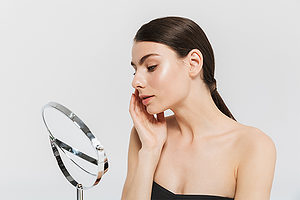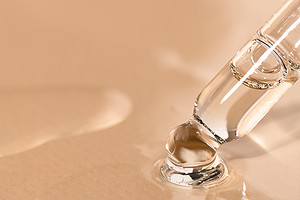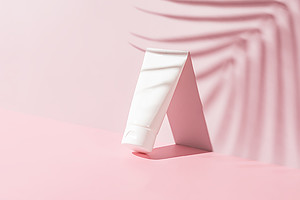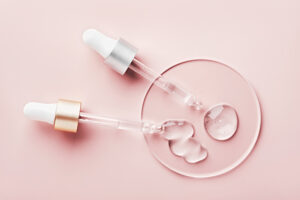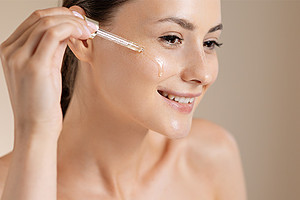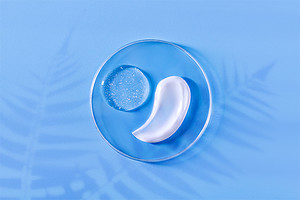What’s the first thing you’d do with the leftover butter in your fridge? Bake some cookies or put it on a toast? Think again, as you might be surprised to know that it can also be used as a natural beauty product.
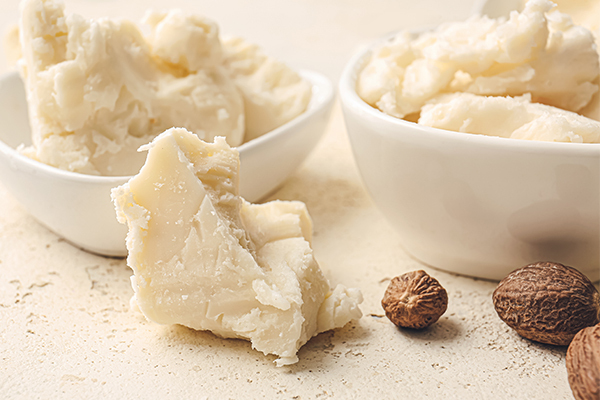
Generally, when you think about butter, you think that butter is derived from dairy products. Yes, it is true, even skin care products like lip balm, soap, and other cosmetic products are made from animal fats. But here we are talking about butter that can be used topically on skin like shea butter, which is plant-based.
If you have dry, itchy, or scaly skin, butter can be a miraculous natural moisturizer. It is profuse with vitamins and fatty acids (1) that are great for deep skin nourishment and hydration.
Note: If your skin is normal, you can safely use body butter as a facial moisturizer. Every skin type is unique, so there is a possibility of some sort of reaction even though butter works just fine on your face. Therefore, a wise choice is to do a patch test before applying butter to your skin. You can also consult a dermatologist if you have any questions or concerns about it.
Read on to know more about the benefits, usage, tips, and many more aspects related to butter.
Article Contents
Why Is Butter Good for Your Skin?
Butter (like cocoa butter, (2) shea butter, (3) and peanut butter (4)) contains vitamins A, D, and E, (5) which are good for skin health. These nutrients help in reducing UV damage, skin inflammation, stretch marks, and skin aging signs and healing wounds by providing moisturization. (6)
Benefits of Butter for Your Skin
The following benefits show why butter is good for your skin.
1. It helps in skin moisturization
Due to its richness in essential fatty acids (EFAs), which are polyunsaturated fatty acids (PUFAs), butter plays a great role as a natural moisturizer. (7)
PUFAs are important for natural skin function and appearance. (8) EFAs maintain the barrier of the skin, which acts as a shield against environmental damage and prevents water loss.
Butter’s vitamins provide deep moisturization and hydration. (9)
2. It provides sun protection
Butter contains natural elements that act as a shield against harmful UV damage from the sun. They either reflect or scatter the UV rays. It prevents your skin from burning as the UV rays cannot penetrate through.
Butter also contains antioxidants that prevent your skin from damage caused by free radicals. Free radicals are unstable molecules with the potential for skin cell damage, which causes wrinkles, aging, and cancer. (10)(9)(11)
3. It prevents skin aging
The antiaging properties of butter (12) are due to triglycerides, vitamins, and other nutrients that it contains in ample proportions. Butter gets rid of wrinkles, fine lines, dark spots, and uneven skin tone. It helps in the natural healing of acne scars. (9)
4. It alleviates inflammation
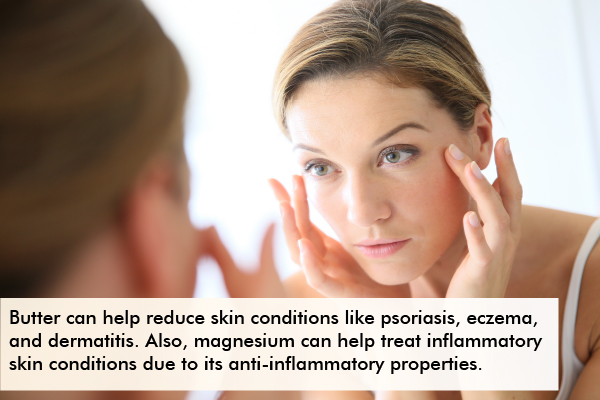
Butter can be helpful in reducing several skin conditions including psoriasis, eczema, and dermatitis.
The magnesium content in butter can be useful in treating inflammatory skin conditions due to its anti-inflammatory properties, which can decrease irritation, swelling, and redness in the skin. (9)(11)(13)
5. It reduces stretch marks
With the richness of essential fatty acids and antioxidant properties, it increases skin elasticity and naturally reduces stretch marks. (12)
6. It helps in healing wounds
With anti-inflammatory, antimicrobial, and antioxidative properties, vegetable butter and oils are often effective in treating skin wounds. They encourage skin proliferation, repair the skin’s lipid barrier function, stimulate dermal reconstruction (skin reconstruction process), and increase collagen synthesis.
These properties are helpful in the process of wound healing. Thus, it can be concluded that butter can help heal wounds. (14)
Which Kind of Butter Is Good for Your Skin?
The different types of butter are as follows:
- Mango butter – It is extracted from the seeds of the mango fruit. With moisturizing, anti-inflammatory, and antioxidant properties, it can help in hydrating, softening, and protecting the skin from environmental damage. It also helps in alleviating the appearance of scars, wrinkles, and fine lines. (13)(15)
- Kokum butter – It is obtained from the seeds of the kokum tree. With its emollient, healing, and regenerative properties, it can improve your skin’s elasticity, tone, and texture. It also halts cracking, dryness, and peeling of the skin. (16)(15)
- Murumuru butter – It is derived from the seeds of the murumuru palm. With its moisturizing, nourishing, and antiaging properties, it improves your skin’s firmness and restores the skin’s natural moisture barrier and elasticity. It also alleviates aging signs such as discoloration, sagging, and wrinkles. (15)
- Cupuacu butter – It is extracted from cupuacu by cold pressing its seeds. With antioxidant and anti-inflammatory properties, it makes your skin soft, supple, and elastic. It provides hydration and moisturization to your skin along with protecting skin from UV damage and premature aging, reducing inflammation, treating dermatitis, and promoting the healing process. (11)(15)
- Shea butter – It is a fat derived from the nut of the shea tree. With its emollient, anti-inflammatory, antiaging, and antioxidant properties, it reduces inflammation, helps moisturize the skin, prevents premature skin aging, and shields the skin from UV damage. (9)(15)
- Tengkawang butter – It is a fat obtained from an Indonesian tree. It helps in skin moisturization and protection from UV damage. (10)
- Avocado butter – It is derived from the rice flesh of the fruit. It has a potent anti-inflammatory property. (17)
- Illipe butter – It is extracted from the nuts of the Shorea stenoptera tree, a plant native to Indonesia and Malaysia. It promotes skin hydration and moisturization. (18)
How to Use Butter for Skin?
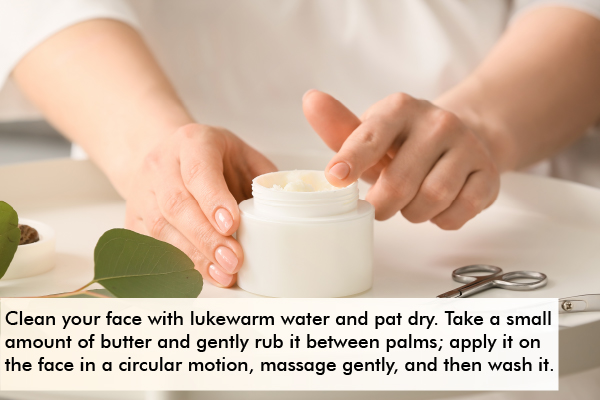
Direct application of butter on the skin (the simplest way)
- Clean your face with lukewarm water and pat it dry.
- Take a small amount of shea butter and gently rub it between your palms to melt it a little bit.
- Apply this to your face and neck in circular motions.
- Massage gently and leave it on for 15–20 minutes.
- Wash it off and apply a shea butter-based moisturizer. You can directly apply shea butter to your face after cleansing and leave it overnight (if your skin is very dry).
- Use shea butter twice a day to treat stretch marks.
Butter as a mask: Shea butter and aloe vera face mask
A shea butter and aloe vera gel face mask is a convenient treatment option for oily and acne-prone skin.
- Take a small amount of shea butter and melt it using a microwave or a stove.
- Let it cool. Add an equal amount of aloe vera gel.
- Mix both ingredients until a thick paste is formed.
- Add 1-2 drops of lemon essential oil and blend well.
- Apply this mixture to your face and let it sit for at least 15 minutes.
- Rinse it off using cold water.
You can also use avocado butter or mango butter instead of shea butter.
Butter as a shower scrub: Butter and sugar scrub
- Take ¾ cup of granulated sugar and ¼ cup of unsalted butter.
- Melt the butter using a stove or a microwave and let it cool down slightly.
- Add sugar to the butter and mix well.
- You can also add your preferred essential oils for fragrance and added benefits.
- Store the scrub in the refrigerator in an airtight container for a week.
- Take a small amount of this scrub and massage it on your wet skin in circular motions for at least 10–15 minutes.
- Focus on areas that need more exfoliation.
- Wash it off with warm water.
- Apply moisturizer if needed.
Tips When Using Butter on the Skin
For positive results, keep the following tips in mind:
- Go for butter that fits your skin. Different varieties of butter have different properties and perks for the skin. For instance, cocoa butter is good for scars and stretch marks, shea butter is good for dry and sensitive skin, and mango butter is good for antiaging and sun protection. You can also mix different kinds of butter to make your custom blend.
- Apply in small amounts and gently massage your skin. You don’t need to use a lot of butter as a little butter goes a long way! Massage the butter gently until it’s absorbed by your skin. Avoid pulling or rubbing your skin too hard. To spread the butter easily on your skin, you can also warm it slightly.
- Apply the butter on damp skin. To prevent dryness and help lock in moisture, apply butter while your skin is still damp, especially after a shower. You can also spray some toner or water prior to the application of butter on your skin to increase hydration.
- Store it in a cool and dry place. Butter can turn stale or melt if exposed to heat, moisture, or light. To avoid this, store it in a cool and dry place away from sunlight. Refrigerating your butter extends its shelf life and makes it more refreshing.
Is Butter Vegan?
No, butter made from animal milk is not vegan and is a dairy product. The fat compounds are separated from the butter by a process called churning.
Animal butter is not a good option for vegans as it contains the fat and protein components of milk or cream derived from buffalo, cow, sheep, goat, or yak.
Butter can also be made from several natural sources such as nuts, seeds/kernels, and beans. (19) Some examples of plant butter are described above.
Is There Vegan Butter?
There are plant-based alternatives to animal butter made from vegetable oil such as coconut oil, avocado oil, and olive oil, mango, kokum, etc. These are also known as vegan butter or plant butter.
Butter contributes to stability, viscosity, and sometimes hardness when added to the emulsions and formulations of natural products. (19)
On Which Skin Type Should Butter Be Used and Who Should Avoid It?
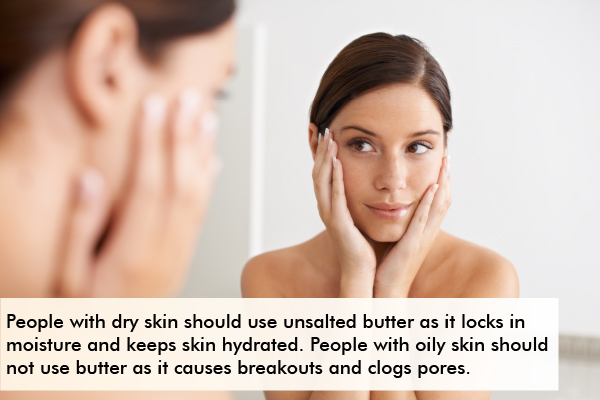
Butter can be used on all skin types and is a natural moisturizer.
However, people with dry skin should use unsalted butter as it locks in moisture and keeps skin hydrated. Salt dries up the skin and dehydrates it.
Moreover, people with oily skin should not use butter as it may cause excessive greasiness and may clog pores.
General Queries
Can I put butter on burned skin to ease the pain?
Putting butter or any greasy ointment on burned skin can make things worse. Grease will slow down the release of heat from the skin. Your skin can get more damaged from the retained heat.
Applying cool water to the skin is the best way to release the heat. Therefore, do not put butter on burned skin.
Can butter remove dark spots?
No, butter cannot remove dark spots, but using shea butter can lighten up the dark spots. Shea butter is known to address issues such as dark spots, dryness, blemishes, and discoloration.
Can I apply skin butter to my face daily?
Yes, you can apply butter if you have dry skin. You can also use body butter every day. Make sure you are using organic and natural products as you will be using them daily.
However, note that using butter regularly on the skin can cause pimples for ladies, but in kids, it can enhance their complexion. You can use butter if your skin is dry; otherwise, it is advised to steer clear of it.
Can I use dairy butter/Amul butter on skin?
It is advised not to use milk cream or butter directly on pimple-prone skin. However, plant or dairy butter have anti-inflammatory properties and contain natural ingredients. These are scientifically-backed properties that improve the skin’s texture and make it young looking.
Applying Amul/salted butter directly to your skin can cause pimples. The recommended butter to be used on the skin and as a face mask is unsalted butter. Amul/dairy butter is mostly salted. So, use mango, shea, cocoa, and avocado butter as these are unsalted butter.
If your face is extremely dry, you can use unsalted dairy butter directly.
Final Word
Body butter is great as it can keep your skin hydrated and moisturized. With powerful antiaging and antioxidant properties, butter can give your skin a youthful glow.
Make sure to consult a doctor before applying any butter, more importantly, if you are a pregnant woman or breastfeeding.
References
- Pădureţ S. The effect of fat content and fatty acids composition on color and textural properties of butter. Molecules (Basel, Switzerland). https://www.ncbi.nlm.nih.gov/pmc/articles/PMC8347263/. Published July 28, 2021.
- Nutritional quality and sensory evaluation of Dabai-fortified Cocoa Bar. https://www.researchgate.net/publication/343579934/.
- (PDF) a shea butter rich in tocopherols (vitamin E) at … – researchgate. https://www.researchgate.net/publication/330513311/.
- Vitamin E. The Nutrition Source. https://www.hsph.harvard.edu/nutritionsource/vitamin-e/. Published March 7, 2023.
- Fat-soluble vitamins – diet and health – NCBI bookshelf. https://www.ncbi.nlm.nih.gov/books/NBK218749/.
- N; PNKSKG. Vegetable butters and oils in skin wound healing: Scientific evidence for new opportunities in dermatology. Phytotherapy research: PTR. https://pubmed.ncbi.nlm.nih.gov/31657094/.
- (PDF) natural anti-aging skincare: Role and potential – researchgate. https://www.researchgate.net/publication/339855992/.
- Paszczyk B. Cheese and butter as a source of health-promoting fatty acids in the human diet. Animals: an open access journal from MDPI. https://www.ncbi.nlm.nih.gov/pmc/articles/PMC9741069/. Published December 5, 2022.
- Effects of topical and dietary use of shea butter on animals – researchgate. https://www.researchgate.net/publication/277021242/.
- Author links open overlay panelMuhammad Arif Darmawan a, a, b, c, AbstractSun protection agents from natural materials have a lower risk of side effects. This study evaluated the effect of lignosulfonate addition to increase the quality and SPF value of tengkawang butter. The sunscreen formulation is made with a mixture. Natural sunscreen formulation with a high sun protection factor (SPF) from Tengkawang Butter and lignin. Industrial Crops and Products. https://www.sciencedirect.com/science/article/pii/S0926669021012310. Published December 30, 2021.
- Fleck CA, Newman M. Advanced skin care – a novel ingredient. The journal of the American College of Clinical Wound Specialists. https://www.ncbi.nlm.nih.gov/pmc/articles/PMC4495740/. Published March 25, 2014.
- Effect of microcapsules of Chia Oil on Ω-3 fatty acids, antioxidant … https://www.researchgate.net/publication/338642831/.
- (PDF) Mango Butter in cosmetic formulations – researchgate. https://www.researchgate.net/publication/331936276/.
- Phytotherapy Research – Wiley Online Library. https://onlinelibrary.wiley.com/doi/10.1002/ptr.6524.
- Dini I, Laneri S. The new challenge of Green Cosmetics: Natural food ingredients for cosmetic formulations. MDPI. https://www.mdpi.com/1420-3049/26/13/3921. Published June 26, 2021.
- Lim SH, Lee HS, Lee CH, Choi C-I. Pharmacological activity of Garcinia Indica (kokum): An updated review. MDPI. https://www.mdpi.com/1424-8247/14/12/1338. Published December 20, 2021.
- (PDF) articaine in functional NLC show improved … – researchgate. https://www.researchgate.net/publication/345981294/.
- Author links open overlay panelThais P. Pivetta a, a, b, et al. Development of nanoparticles from natural lipids for topical delivery of thymol: Investigation of its anti-inflammatory properties. Colloids and Surfaces B: Biointerfaces. https://www.sciencedirect.com/science/article/abs/pii/S0927776518300614. Published January 31, 2018.
- (PDF) plant based Butters – Researchgate. https://www.researchgate.net/publication/279727430/.


